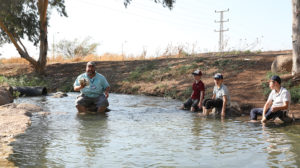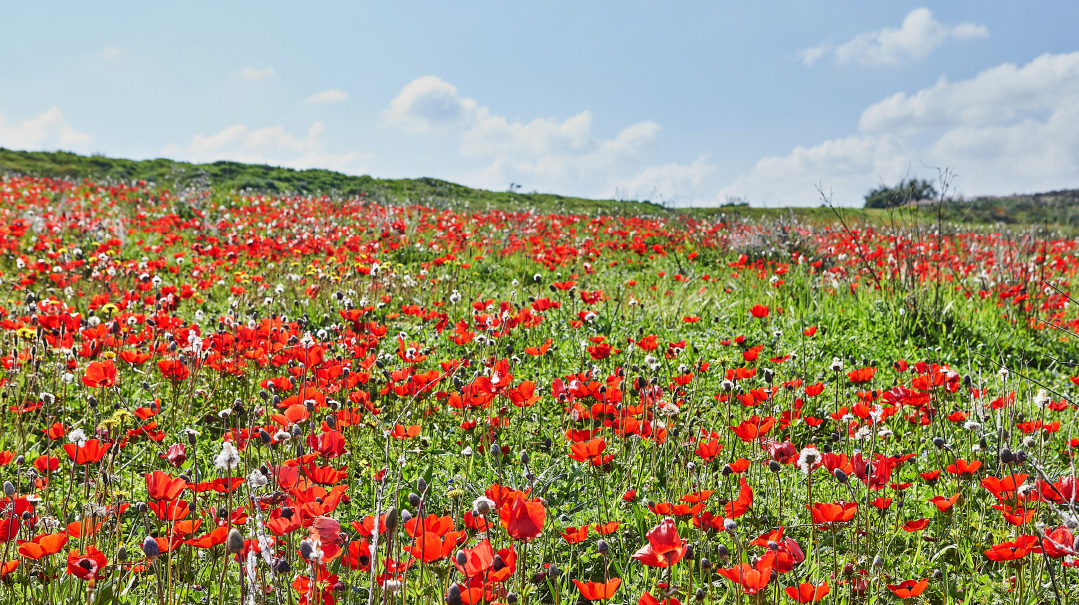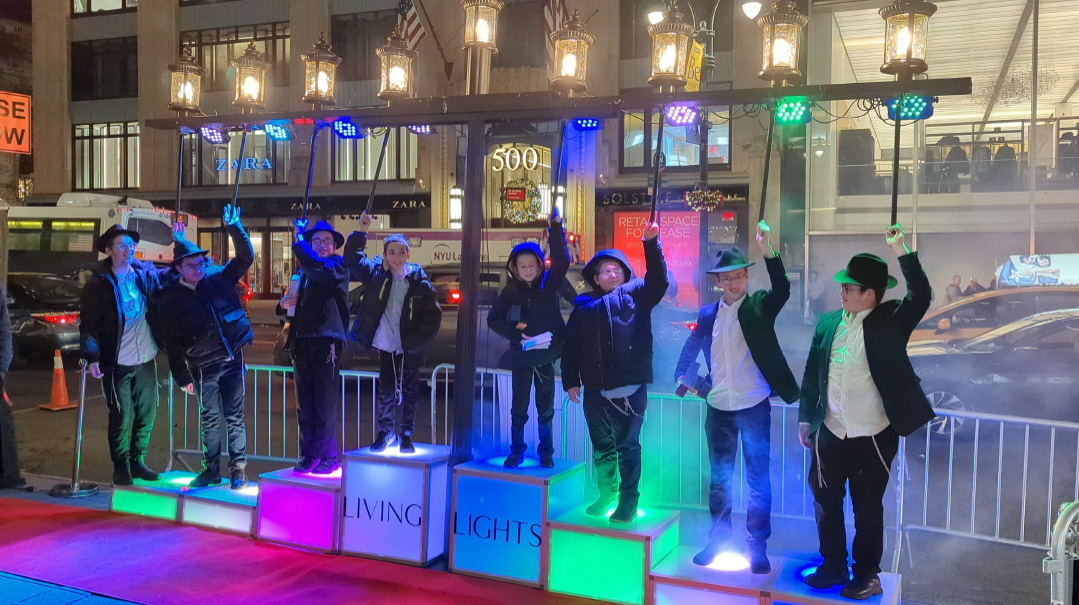Move a Mountain
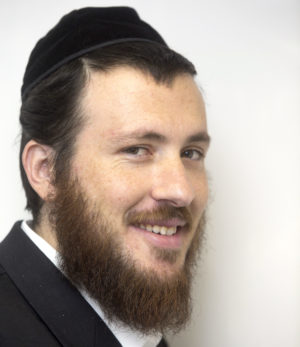
Scaling cliffs in Romania with nothing but their backpacks and each other, a group of chassidish bochurim learn about climbing upward and inward
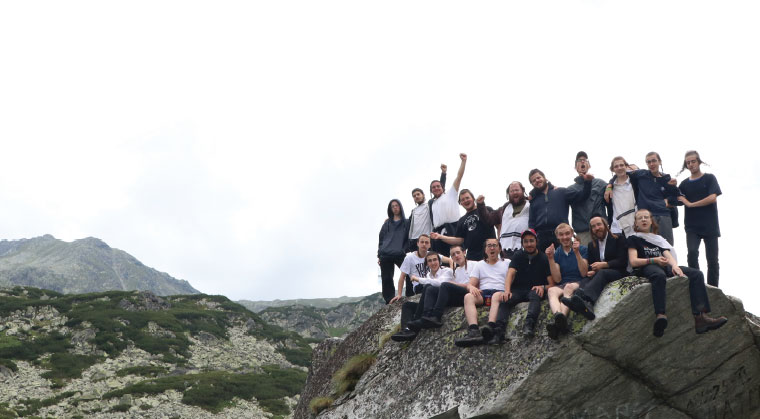
T
he night was pitch-black, and here I was, scaling a cliff somewhere in the Carpathian Mountains with a group of chassidishe bochurim. If the cold and darkness wasn’t enough, suddenly it began to rain. But that just seemed to energize our leader, who knew that the difficult terrain and the forced dependency on each other had the capacity to break barriers.
“Everyone stand in a circle and hold hands with the person next to you,” he ordered. On both my right and left, a sweaty hand closed around my own. I stood there in the quiet and the darkness, aware of nothing but the two young hands loosely gripping mine. “Listen,” the voice whispered. “Listen to yourselves. Listen to your souls. It’s midnight now — a time of great potential. Every one of us has been through many experiences. We’ve had ups and downs, successes and failures. We’ve been insulted and offended, challenged and hurt, and we’ve been carrying all that baggage with us. Now we’re here, alone with our Father in Heaven, Who is with us in Romania just as in Eretz Yisrael. Each one of you can call out to him however you want — Abba, Tatty, or even Daddy. And after every ten times that we call out, we’ll raise our voices together and hold hands even more tightly.”
For some reason, I felt a chill run up my spine. My hands shook as beseeching cries rang out in the darkness. And then the tears came.
More than Cliffs
if all began when I heard about a special group of bochurim from a yeshivah called Ka Echsof in Beitar Illit who would be participating in a “wilderness therapy” tour for four days, alone in the mountains, with only a map, flashlight, a single rucksack, a sleeping bag, and a tarp. From Israel, it sounded somehow like a dream vacation.
Ka Echsof is one of several new yeshivos that have sprung up in Israel in answer to a very particular demographic need ; it’s a place for high-school age chassidishe bochurim who, due to family or personal issues, haven’t been able to find their place in the mainstream yeshivah system. It’s not a “drop-out” yeshivah, though: Here, shiurim are in Yiddish, the boys have kept their chassidish levush, no one’s cut off his peyos, and boys can move on beyond their baggage.
And that was the energy I felt when I first met my traveling companions at the airport after a night of rearranging my travel pack following a message from the organizers: “The shoes and sleeping bag are an absolute necessity. So is the flashlight.” Then, there was a list of things that I should not bring: “No camera, no MP3 player, no cell phone, no soap.” Plus, they informed me that a certified paramedic would be accompanying the group and added, in no uncertain terms, that my travel insurance had to include coverage for extreme risks.
I might have been new at this, but the group had been preparing for quite a while already, having undergone physical and mental training, learning about the conditions on the ground, and experimenting with using maps for navigation.
Once a week, they met with Reb Chaim Katz, a talented therapist who is known throughout the alternative yeshivah world as the guru of wilderness therapy. Katz works with many institutions running these wilderness groups. “We do this a few times a year, in the desert, in the woods,” he says. “We disconnect from the complexities of life and learn about trust — in each other and in Hashem. These boys have many layers, and we never know what’s really going on inside. But this kind of tiyul peels back those layers.”
This was going to be more than just climbing up some steep cliffs — the boys would experience a therapeutic journey that would take them into the depths of their souls as they scaled the Carpathian Mountains, where they would learn about fear, trust, mutual reliance, and emunah. “Don’t worry,” one of them said to me, sensing my ambivalence. “This may be a survival expedition, but it will be fun.” By the time the trip would be over, I too would be transformed.
Track Record
We touched down at the tiny airport in Craiova, Romania, where we crowded into taxis along with our luggage, toward the train station. While waiting for the train to our destination, every bochur took responsibility for a specific job: A few boys went out to the nearby marketplace to purchase fruits and vegetables, while two others went in search of a money changer who would exchange their euros for Romanian leu. The rest of the group stayed behind to guard our belongings.
Waiting for our train afforded me an opportunity to shatter my preconceived notions about “special” yeshivos and their students. One of the boys, who was sitting on the ground beside me, took out a volume of Mishnah Berurah and began studying it. “Uvelechtecha baderech,” he said with a smile. I wonder how his former mashgiach, who expelled him from his previous yeshivah, would react upon hearing that.
While we sat on the train (which reminded me of World War II-era pictures), Reb Chaim began the process of building solidarity. We were divided into four units, each made up of five or six young men, who would have to learn to survive together, to trust each other, and to share their resources. The groups, therefore, had to be balanced, since boys were of different ages and strengths.
Actually, the boys weren’t totally on their own. A group of faculty members, including the menahel ruchani, Rabbi Aharon Gombo, had come along. Rabbi Gombo explained how the division of labor in the wilderness is really an extension of the institution’s basic philosophy. “It’s all about believing in these boys,” he says. “Some of them are great cooks, so we let them use the kitchen. Some play great guitar, so we encourage that. Some have good memories, so we encourage them to memorize Mishnayos. Some can really learn a daf Gemara, so we push them to do that. Whatever he can do, we encourage him to do. That’s what it means to really believe in him. As soon as he knows you believe in him, it’s amazing how he blossoms, becomes a different person, starts to learn, starts to shteig, starts to feel closer to Hashem. I always tell the boys, ‘Hashem doesn’t want you to be someone you aren’t. Whatever your kochos are, that’s what He gave you to work with.”
Nothing to Fear
Every group received a sack of potatoes, a knife, a small canister of cooking gas, a single pot, an assortment of canned goods, some basic spices, fruits, and bread. But the division wasn’t exactly equal. One group received the entire ration of salt, another got more canned goods, and a third didn’t have any flour. And only one group was given the means to make a fire.
“In life,” Reb Chaim told his charges, “it’s important to develop fair and effective negotiating skills. All the groups will need to use those skills in order to survive.”
The first decision came very quickly: Every group had been given a tempting package of cookies, but if they polished off the entire package at the beginning of the trip, they might come to regret it over the coming days. “This, in a nutshell, is our lesson for life,” Rabbi Gombo told a boy in his group who looked pretty hungry. “Life is about learning to delay gratification. If we make a small sacrifice now, we’ll have more later.”
David, who will be our nature guide, learns in a yeshivah in the Jewish Quarter of the Old City, is a “survivor” by profession — that is, an expert on wilderness survival. He gets energized surrounded by trees, animals, darkness, and hostile weather conditions. His eyes glitter at the thought of what we’re about to undergo.
“When you’re out in the wilderness, you must never squander resources,” he tells the group. Over the next few days, he would never peel his fruit or vegetables and sacrifice valuable vitamins, minerals, and calories.
Anyone on a wilderness expedition must have a knife, which will help him contend with overgrown plants, wild animals, sealed boxes, and plenty of other obstacles or hazards. He must also have food with enough calories to keep him energized. He needs a box, pot, or some other item that he can use to prepare food. He must have a way to create fire, and he must be equipped with sufficient water and with some type of canopy for shelter.
David, to be sure, can set up a shelter in ten minutes. All he needs is a tarpaulin and a few ropes, items that he’s carefully packed in his rucksack. He brought only a single change of clothing. “We’re surrounded by rivers,” he says, “so it’s easy to do laundry.”
Build a Bridge
We were supposed to get from the train station to a village, but that village seemed to be at the top of a mountain, and there wasn’t a single taxi in sight. “If you don’t want to stay here tonight, try to do something,” Reb Chaim encouraged the group. The first thing the boys did was to daven for Divine assistance — first Minchah and then a pledge to tzedakah, as we made our way down the main road, where we were able to stop a few old cars.
David sat in the first car, busy with his map and compass. The sound of dogs barking announced that we’d arrived in the village, but the guesthouse was full. David was told there was a guest house about a two-hour hike away where we could spend the night, but from where we were, it wasn’t accessible by car — and it was already 10:00 p.m.
Before long, there were two claps of thunder, and we found ourselves in the midst of a torrential downpour. Reb Chaim was prepared for that, though; every member of our group received a large plastic poncho, which covered us together with our packs.
Have you ever tried to walk through mountain terrain in total darkness? “Take out your flashlights,” Reb Chaim called. Soon we looked like a team of coal miners as we walked with lights mounted on our foreheads, holding onto each other for support.
David stopped for a moment. Two more beams of light were coming toward us through the darkness from the top of the mountain. There was something calming about the knowledge that another two adventurers were braving this path. They told us that they were from Spain and they had been here for a few days — and they had some bad news: “The bridge collapsed,” they said.
They took out laminated maps and showed David and Reb Chaim the spot where the bridge had given way. The path that we had planned to take was not accessible; the river had overflowed and cut off passage. “You’ll have to make a three-hour detour,” they said. “and not at night.”
Reb Chaim, undaunted, took advantage of the crisis, while he instructed us to form a circle. “In a circle, everyone is equal,” he explained. He reminded us that the expedition was an analogy for life itself, with all of its twists and turns and pitfalls and hardships. “Above all,” he said, “we need to clear away all the emotional baggage we’re carrying. It weighs us down on our journey. So right now, I would like to ask everyone of you to think of something that’s weighing down on your heart, something that’s distressing you, something you’re struggling with. Let’s let go of all those things together.”
Reb Chaim asked everyone to let out a loud a cleansing sigh. Slowly but surely, the boys’ voices rose as their grips tightened, the falling rain mingling with their tears. The pressure on my hands grew more powerful, and there was an air of certainty that we would get through this.
By majority vote, it was decided that we would retrace our steps to the village and continue on in the morning. The Romanian owners had long since gone to bed, so for the time being, we decided to spend the night in a small area in the courtyard. We spread out mats and set up our sleeping bags, gathered to daven Maariv, and then and split into groups for supper, while Reb Chaim and I wandered among the groups in search of something to eat. That, it turned out, was part of the challenge. “The goal is to learn to give to others even when you don’t have enough,” he said.
At about 2:00 a.m., I finally managed to burrow into my sleeping bag. It was cold and damp — what could be worse? An hour later we found out what: We were being pounded by a downpour. We crowded beneath the overhang on the side of the small building while David managed to set up his makeshift tent. Finally, we fell asleep again. The next time we woke up, it was to the rays of the rising sun. I looked up and momentarily froze in terror — a large white dog was sniffing around at my feet.
The Climb
The boys leapt to their feet, ready for the day ahead. But if you thought Shacharis in the middle of a Romanian village would be a hasty affair, you’ve never davened with these bochurim. First there was about 15 minutes of stirring niggunim, followed by an hour-and-a-half Shacharis that felt more like an intense kumzitz.
Sometime during the day’s nine-hour hike, the boys were told to stand in pairs and stretch their arms out toward each other, forming human barriers. Other members of the group were then instructed to run toward each pair of boys, relying on their friends to move their outstretched arms at precisely the right moment so that they would be able to run through. After the first stage of the game, Reb Chaim changed the rules. Now the boys had to wear blindfolds while they ran toward each other. The goal was to build mutual trust.
After a day of climbing, both into the mountains and into ourselves, we arrived at a guesthouse where we were offered filthy mattresses but real beds. By this point, we didn’t care too much. The following morning, at the crack of dawn, one of the boys woke the rest of the group: “I found a stream!” he announced and suggested that everyone begin the day with a morning tevilah. David led the way, searching for somewhere we could enter the rushing water. But when he tested it with his finger, he discovered that it was as cold as ice. In those freezing temperatures, entering the water seemed like a surefire way to catch pneumonia.
“The Baal Shem Tov says that immersing in a mikveh can’t cause harm,” one of the bochurim announced confidently. He was the first to jump into the stream, and his friends quickly followed him. It was impossible to toivel more than once— the frigid waters took your breath away and numbed the entire body. But the shivering boys came up with an inventive way to warm themselves — they broke into a spirited dance that got their blood flowing once again and prepared them for another lengthy and impassioned Shacharis.
Before we set out on the hike, Reb Chaim gathered everyone in a circle, and each of the boys was instructed to take a small slip of paper from him and then put it away. Each piece of paper contained the name of another member of the group — mine said “Moishy.” I had no idea what this meant; I would find out only two days later.
With that, we set out on our way. The mountaintop, littered with patches of snow, was already visible. Just before we reached the summit, Reb Chaim asked everyone to stand still.
“Do you see that mountain facing us?” Reb Chaim asked. “That’s the summit that we have to reach. That’s the mountain we have to conquer. Does it look impossible to you? Well, I have news for you: Within half an hour all of us, without exception, will be standing there.” But it was not the only height we’d have to scale. Reb Chaim asked each of the boys to reveal to the others a specific “mountain” that he has been attempting unsuccessfully to “climb.” One young man finally responded, “My dream is to establish a good Jewish home, to have good children who will not suffer from having to transfer between yeshivos that don’t want him,” he said. Another was struggling with learning daf yomi, and a third with curing himself of his fear of other people.
“The next portion of our hike is something that each of us will do on our own,” Reb Chaim said. “It’s a hike of about half an hour, during which time I want you to think about your personal aspirations and about the steps that you are going to take in order to begin the process of reaching them. When we reach the top, I want to hear your answers.”
In order to begin the climb, we had to cross a stream of water. The boys lined up on one side, and the first bochur began moving forward. We all remembered the “mountain” that he wanted to climb: He wished to build a proper Jewish home. Now his friends encouraged him, singing “Od Yishama” while he traversed the stream and began slowly making his way toward his goal — both physically and emotionally.
It was only after he had disappeared into the distance that the next boy was allowed to move forward. This was the young man who aspired to learn for two hours a day. The rest of the group began singing “Lulei Sorascha.” He crossed the stream and disappeared.
Then came the time for my own accounting. By that time, all the bochurim had already crossed. Reb Chaim Katz looked at me and asked, “What about you?” I couldn’t come up with a satisfactory answer. “If you don’t have a height that you aspire to, you’re doomed to remain in the valley,” he said.
I hiked to the summit along with Reb Chaim: I wanted to understand his secret. In fact, Chaim Katz began his career years ago as a conventional mashgiach, but he realized that for all his talent, his words didn’t always penetrate their target. He learned about this unique therapeutic method, although at first, he was skeptical about the idea of emotional healing through adventures in the wilderness. But after several years in intensive training, he realized that he had discovered a special tool with which he could work wonders. He established the Gisha Center, which provides therapeutic experiences for dozens of yeshivos, organizations, camps, and private groups and individuals.
How to Bear It
The sun was beginning to descend toward the horizon. “You know,” one of the boys commented to me, “sometimes the descent is more difficult.” He said he’d found the same to be true of life in general. “People on the outside think it’s easy to slip into a downward spiral, but it isn’t. You don’t simply go down; you fall. You become broken and shattered.”
From a distance, I noticed David talking to two other hikers. His expression was fearful. “Guys, this is not a good situation!” he called out in his American-accented Hebrew. The two hikers had shown him a picture they’d taken: The unmistakable footprints of two bears.
David’s map showed that there was a lodge on the way; we would have to move quickly in order to get there before dark. But when we finally arrived at the lodge, the bleary-eyed owner who’d obviously been drinking informed us that there was no room. And no, he would not permit us to camp out on the grounds surrounding the lodge. He had also heard that there was a bear in the vicinity, and soon he planned to release his dogs in order to alert him to any danger. Sleeping outdoors, then, was not an option either.
Reb Chaim immediately took command of the situation. “We’re in this together,” he said, “and we’ll get through this challenge. It will make us stronger.”
The first step was for us to split up into pairs. “Along the way, only one person in each pair should turn on his light. We need to conserve our batteries,” David explained. Then, David introduced a number system: Every person received a number between one and 20, and every 15 minutes, the entire group would come to a halt and call out their numbers in order. That way he could make sure everyone was together.
As we walked, and walked, I learned a lot about the complicated life stories of my companions, about their challenges and their struggles. Two hours later, Reb Chaim decided that we should take a short break. He urged all of us to remember these moments — whenever we found ourselves facing hardships or challenges, we should connect back to this night. Still an hour away from our destination, we had proven that we can survive whatever challenges come our way.
It was 2:00 in the morning and our destination was still quite a distance away — but then we all came to a sudden stop. Through the darkness, we saw 50 pairs of bright eyes staring at us — eyes that certainly did not belong to human beings. And then came the sound of aggressive barking. Even David tensed — there was nowhere to go. And so, we picked up sticks, stones, and any other makeshift weapons within our reach to fend off these beasts. Then we saw them — dozens of sheep guarded by two dogs, whose barking had terrified us.
Now that our fear was gone, my thoughts, at least, were already fixated on my sleeping bag, but my young companions wouldn’t let that happen just yet — after all, we hadn’t davened Maariv.
The Best Gift
The last day of our trip was dedicated to shared introspection plus a farewell exercise. “Two days ago,” Reb Chaim reminded us, “each of you received a slip of paper with a name. Now, you all have half an hour to scavenge the area, and find a gift that you feel is most suited to that person.”
I spent the next half hour wandering around, but that remote village wasn’t exactly a department store; I saw nothing but grass, puddles, and stones — nothing that I thought would interest Moishy, my new friend. “The search itself is the purpose,” Reb Chaim Katz would later explain to me. “The greatest gift you can give someone is to be thinking about him and to be concerned about his well-being.”
Half an hour later, we reconvened. One person picked up a rusty, broken machine and announced that it was his gift to a friend who had been blessed with “golden hands,” who was always capable of fixing everything he came across. Someone else held up a stone and announced that it was a gift for a friend who had demonstrated his ability to remain strong and resolute in the face of any challenge and who was never broken by hardships. Another bochur presented a handful of flowers to his designated recipient, and yet another boy handed over a small glass vessel filled with water — an allusion to the Torah itself.
And me? I didn’t know Moishy at all before this trip, but over the last four days, I discovered that he is a person with a rich inner world who loves to read and think and ponder. And so, I handed him a fistful of wheat I found on the ground. Outside might be chaff, but the kernels inside are the prize.—
(Originally featured in Mishpacha, Issue 753)
Oops! We could not locate your form.





